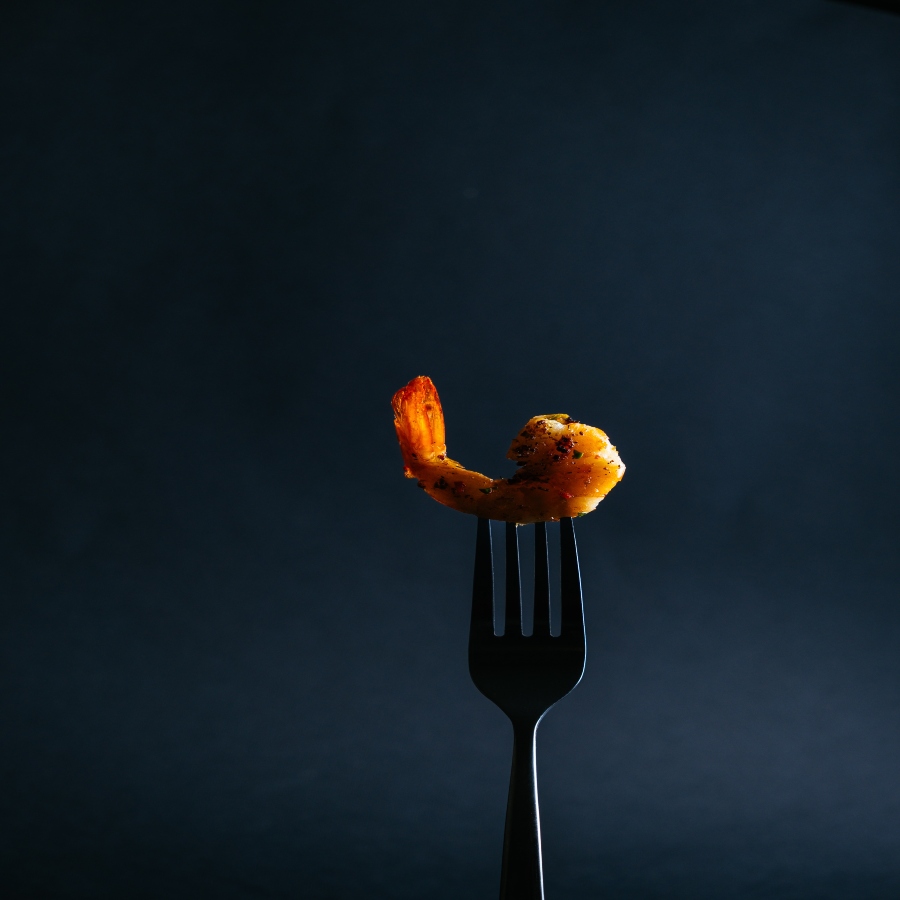A shrimp’s heart is in its head. You used to say your heart was in your stomach when you couldn’t get out of bed all day. You won’t eat shrimp because your dead dad who you hated used them as bait when he took you catfishing as a kid. I found that out when I made scampi on our six-month anniversary, and you refused to eat it. That made me cry, then me crying made you cry, then we spent the whole night sulking and chain smoking on your back steps instead of eating shrimp and having sex like I had planned.
The commercial shrimping industry rakes in over 50 billion dollars annually. I used to buy the pre-cooked frozen jumbo prawns from Walmart for $4.99 a pound. That was fancy for a waitress in West Plains. I’ve never eaten them fresh. I’ve never been to the coast, any coast. The farthest I’ve been is Alton, Illinois to visit my grandfather’s grave. You wouldn’t go with me, either. You said the drive was too long and you don’t like my taste in music.
All shrimp are born male. Later in life, their gonads can develop into ovaries. A female shrimp can lay up to 14,000 eggs at once. You knew I’d never wanted children, in fact, we had laughed about our shared distaste toward kids on our first date. We drank a whole bottle of convenience store champagne and had sex for the first time on your kitchen linoleum. In the morning, you fried bacon for breakfast, and we ate the whole pound of it in silence, licked the grease from our fingertips. You told me to come back that night, and I said, Deal, and the rest happened fast and slow at the same time.
From conception to death, a shrimp will evolve through 16 different life stages. Depending on who you ask, humans go through 5 to 12. Does this make the shrimp more complex than us? Maybe, I think. I feel like I’ve gone through 0 life stages sometimes. And sometimes I miss eating those pre-cooked Wal-Mart shrimp, even though I always thought they kind of looked like weird alien embryos. Another thing I gave up for you, even though you never asked me to.
But then again, shrimp skitter around in exoskeletons, they’re invertebrates, just like the crickets or cockroaches we crush underfoot in your kitchen sometimes. This makes them sea bugs, technically, fish food. Maybe you’re right that they’re better suited as bait. Maybe I should pay more attention to what I put into my body.
A shrimp’s color is determined by its environment, and the Mantis shrimp can see colors we can’t. In the second year, we painted your spare bedroom baby blue for our son-to-be, like a good, God-fearing hetero couple should, laughing together when I joked about that. You were so excited, you said, you would have a family again. We stenciled the name we had chosen for him on the wall in pencil, but I bled him out before we got the chance to color it in. We never did paint over the stencil or erase it. You stayed in bed most days, called in sick. I had lost my appetite. All I could stomach for weeks was stale bread I’d steal bites of at work. I started picking up more double shifts so I wouldn’t have to be at home.
Some shrimp can snap their claws loud enough to kill nearby fish or rupture a human eardrum. I put on a hard exterior after we lost our son, thrashed my claws when you tried to come close. We stopped touching each other, stopped talking, stopped sharing meals. I wondered if you found me attractive anymore; you hardly looked at me. I spent hours staring in the bathroom mirror and pinching the folds of fat beneath my arms, between my thighs, across my lower stomach. I imagined taking a pair of kitchen shears and slicing off long, soft strips from my belly, tossing them outside for the turkey vultures. You bought a blow-up mattress and put it in the new spare room, with its walls still painted American Spirit blue and the boy’s name stenciled in. You started staying there, away from me, though I can’t remember how long it’s been. And I sleep better alone now, honestly.
Shrimp can’t swim, not really. They can’t control their bodies. It’s more like an illusion: They propel themselves through the water with small swimmerets they keep concealed beneath their abdomen. They typically move backward when encountering predators. We’ve been moving backward since our son left, eating less, fighting more. I still love you, I told you after I snapped at you again the other night. But you couldn’t hear me, or you couldn’t bring yourself to answer. I can hear you refill your air mattress through the walls sometimes, the motorized air pump growling like a dying animal. I hear you settle in when you try to sleep, the rush of air when you fall into bed, and I can hear you think throughout the night. I wonder if maybe we should repaint the walls. A deeper blue might be nice. Or one of the colors shrimp see that we can’t, a shade unimaginable to our small, human minds.

